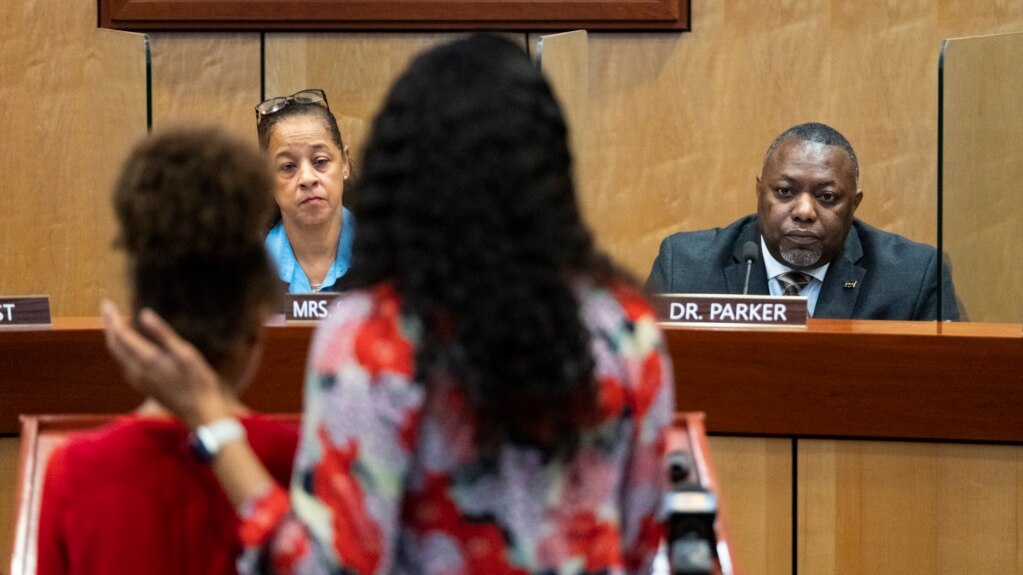Educators say children’s behavior reached crisis levels after the pandemic shutdowns. Now, many schools are facing pressure from critics to rethink the ways they discipline students.
In recent years, some schools have adopted policies intended to reduce suspensions and expulsions. Some experts say suspensions and expulsions hurt students’ ability to learn and largely affect minority students.
But more students have been misbehaving. Some school systems have faced questions from teachers, parents and lawmakers about whether a softer approach can effectively deal with problems that disrupt classrooms.
The latest example came recently in Newport News, Virginia, when a 6-year-old shot his teacher. Teachers there complained at a school board meeting that the school system had become too easy on students. Students who physically attacked school workers were often permitted to stay in the classroom, they said.
The local school board said it would take “the necessary steps to restore public confidence” in the school system.
Misbehavior has been on the rise since students returned to classrooms following COVID-19 lockdowns. The National Center for Education Statistics questioned school leaders on the issue last summer. It found that 56 percent of school leaders said the pandemic led to increased classroom disruptions from student misbehavior. And 48 percent said it led to more acts of disrespect toward teachers and staff.
Rachel Perera studies education at the Brookings Institution in Washington, D.C. She said new criticism of approaches to discipline could slow changes in policy.
“There’s a lot of pressure on schools right now,” she said. “I worry that that will translate to schools falling back on old practices that are not effective in terms of supporting students in the way they need.”
Policy changes are already happening. In Gwinnett County, Georgia, the school board approved the use of a “restorative practices” program in August. The program was meant to center on conflict resolution, repairing harm and rebuilding relationships in the classroom. But the district paused the program in December, with plans to restart it in the 2023-2024 school year. It did so after concerns were raised over incidents in school, including a video of a student attacking a teacher at a high school.
As of 2020, 21 states and the District of Columbia had passed legislation supporting the use of restorative practices in schools. That information comes from the Georgetown Law Center on Poverty and Inequality.
Carrying out the practice correctly takes time, resources, and community support, said Rebecca Epstein. She is the center’s executive director.
“Change is hard,” Epstein said. “It can’t be up to individual teachers alone to shift the culture… It really takes a whole school cultural shift.”
Using restorative justice does not mean a school cannot remove a disruptive student from the classroom, said Thalia González. She is a professor at the University of California College of the Law, San Francisco. But unlike other forms of discipline, restorative practices aim to understand the causes of a student’s behavior. The approach is less centered on punishment.
Traditional discipline has widened inequities. Black children are often suspended or expelled at rates far higher than white children. Research has found that these differences in discipline can have lifelong effects for children, including worsened educational results and higher rates of imprisonment.
The Virginia city of Newport News has its own history with restorative justice.
At a school board meeting in 2017, district officials discussed efforts to reduce school suspensions while using restorative practices. At the same time, Tracy Pope was the school system’s restorative practices specialist. She said at the meeting that such practices did not do away with anything already in place. She described the practices as "another way to look at how we do discipline.”
Even before the shooting of a first-grade teacher, many educators were unhappy with the way the school system dealt with student discipline. In a spring 2022 opinion study of teachers and other employees, only 60 percent said school leaders were addressing poor behavior among students.
I’m Dan Novak.
Dan Novak adapted this story for VOA Learning English based on reporting by The Associated Press.

